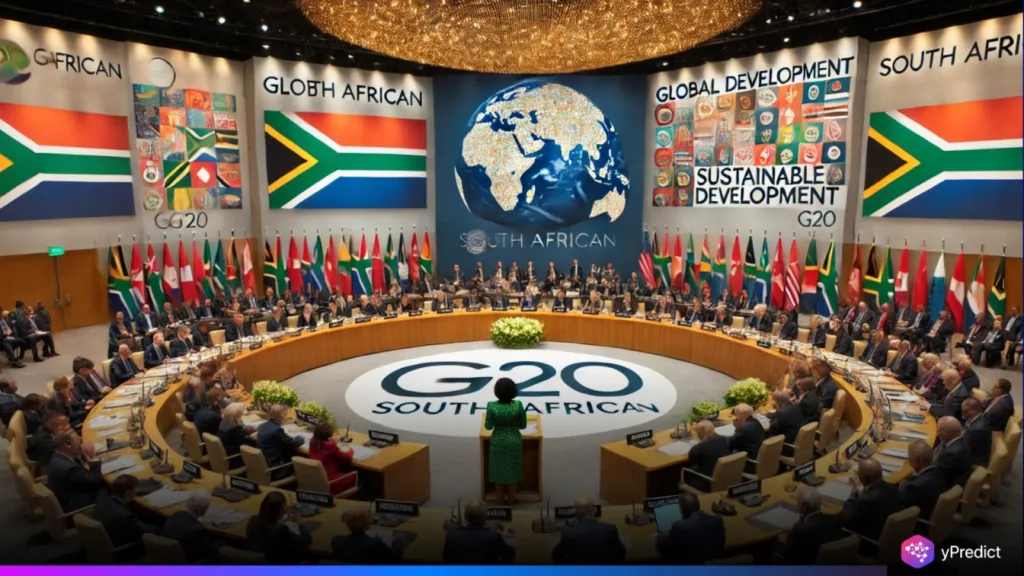
The G20 Summit takes place imminently in South Africa. Heightened levels of trade uncertainty ahead of the meeting have heightened market apprehension about global profits and business confidence. Significantly, the G20 accounts for over 85% of the world’s GDP, amplifying the stakes for economic diplomacy as they relate to the AI industry, still at risk of disruption across borders.
Trade Disputes Weigh on AI-Driven Markets
The aftershocks of trade tensions are continuing to shake AI investments in both public and private markets. A clear example of this came in April 2025 when the U.S. launched a new series of tariffs that led to a steep drop in the S&P 500, which fell below 5,000. Even though the 90-day period of a glimmer of a tariff freeze recovered some investors’ nerves, the fundamental uncertainty remains. AI developers and chip manufacturers operating across borders saw immediate pullbacks in investor interest.
The World Economic Forum just affirmed this perspective, pointing to evidence linking geopolitical friction and slower capital distribution in frontier areas such as AI. Companies heavily dependent on transnational relationships and global supply chains will pay for any policy changes the geopolitical momentum produces. With all this uncertainty, the pace at which AI startups and enterprise-scale businesses have begun to pause their growth plans and/or reduce projected spending is striking until after the G20 Summit provides more clarity.
G20’s Economic Weight Raises Stakes for AI Sector
The upcoming G20 Summit has attracted heightened attention from global investors and AI stakeholders. With member nations accounting for 85% of global GDP, decisions or dialogues forged at the summit could dramatically influence the future of AI commerce. Delegates are expected to discuss trade standardization and data governance—two key pillars for AI innovation. According to insiders following the summit preparations, technology partnerships, particularly in the areas of AI and digital infrastructure, continue to be very sensitive issues for several member countries.
In addition, the host country, South Africa, has indicated that it may give priority to tech sovereignty and ethical AI frameworks, both of which may appear to directly complicate multilateral AI investments. If agreement can be reached among the G20 on creating new trade pathways or collaborative frameworks, it might be the prompting that multinational AI ventures have long awaited to resume further growth.
Earnings Forecasts Reflect AI Sector Volatility
AI firms have also begun to reflect the pressure of trade tensions in their earnings forecasts. A 2023 study in the Journal of Financial Economics revealed that companies missing estimates by as little as 2% due to external trade shocks experienced an average stock price decline of 4% within one week. This pattern is re-emerging in current quarterly guidance. Major AI players, including firms focused on autonomous systems and language models, have revised their projections in anticipation of further global instability.
Public filings cite uncertain export controls, shifting data compliance rules, and rising costs for imported computing resources. Several executives warned that unresolved G20 negotiations could lead to further downward revisions across the board. The sensitivity of AI earnings to trade policies shows how deeply integrated the sector has become with global supply dynamics. While demand remains strong, operational bottlenecks and restricted trade corridors continue to suppress margins and delay product cycles.
AI Investment Outlook Hinges on G20 Diplomacy
As investors await outcomes from the G20 Summit, the mood remains cautious. Venture capital flows into AI startups have slowed in recent weeks, with many funds adopting a “wait-and-watch” approach. Even large-cap AI companies are opting for conservative capital strategies, citing the unpredictability of trade outcomes and regulatory realignment.
Market analysts agree that the G20’s posture on trade cooperation and digital standardization will heavily shape AI’s investment climate for the remainder of 2025. Any signal of collaborative intent could ignite renewed momentum across AI public equities and private deals. If trade tensions escalate further, market uncertainty may become the overarching constraint on AI development this year.






